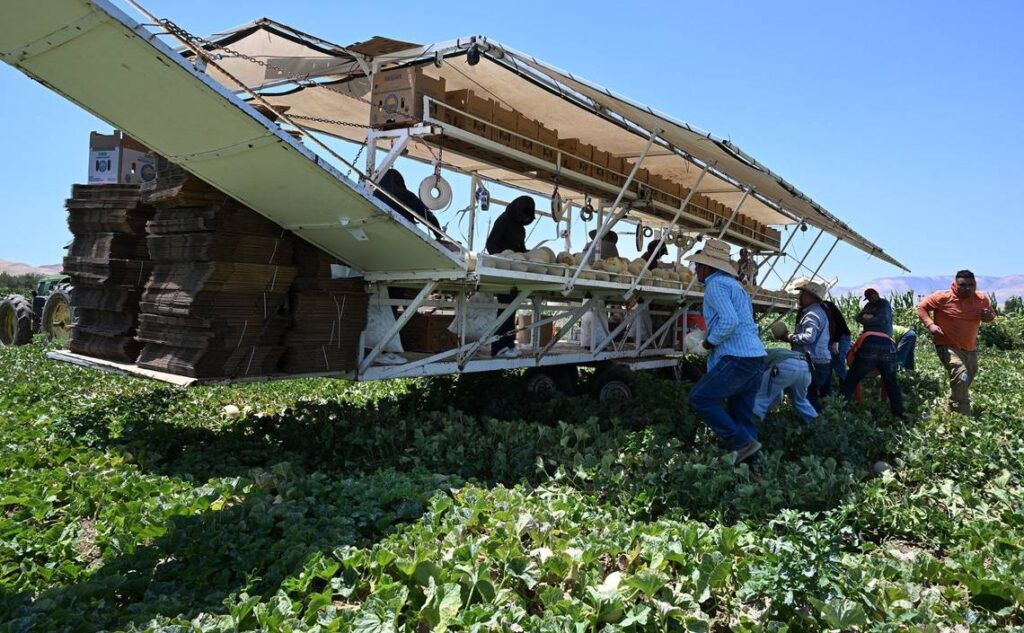Farm laborers and growers in California’s Central Valley are feeling immense fear and anxiety over former President Donald J. Trump’s potential return to power and his aggressive plans for mass deportations. Many in the undocumented immigrant community view the uncertainty leading up to the upcoming election as eerily reminiscent of the distress they felt after Trump won in 2016. Trump’s latest deportation proposal includes invoking the Alien Enemies Act of 1798 to target undocumented criminals and enacting sweeping measures such as creating detention camps, expediting deportations without due process, and ending birthright citizenship. This plan threatens nearly one in three Latinos in the region, either directly as undocumented individuals or as part of mixed-status families, amplifying fears about widespread family separations.
The implications of Trump’s mass deportation strategy could be particularly severe in California, where significant segments of the Latino population are directly impacted. FWD.us reports that almost 4 million Latinos in the state could find themselves in jeopardy due to these aggressive immigration policies. Critics of Trump’s proposals highlight the monumental cost associated with such deportation efforts, with estimates from the American Immigration Council placing it at a highly conservative $315 billion. Political consultant Mike Madrid underscores the potential social ramifications of a culture that actively seeks to deport undocumented individuals, warning against underestimating the gravity of the situation and its impact on both families and the economy.
Amidst these fears, individuals like Sandra Garcia, an experienced Central Valley farmworker, voice their concerns about the lives of those who could be affected, including her sister, who has recently gained a work permit through special provisions. Statements from farmers and agricultural workers like Joe Del Bosque emphasize the precarious position the agricultural industry would find itself in under such policies, particularly for crops that require manual labor. Del Bosque criticized the lack of understanding of farmworkers’ essential roles in the food supply chain among politicians and emphasized the importance of a stable workforce, given the economic interdependencies of agriculture on undocumented labor.
On the political front, prominent leaders and advocates have pledged to resist Trump’s potential efforts at mass deportations should he be reelected. Manuel Cunha, of the Nisei Farmers League, rejected the notion that the livelihoods of established workers could be threatened, vowing to fight against policies that jeopardize their rights. Similarly, U.S. Senator Alex Padilla condemned Trump’s strategies as harmful to numerous Latino families and communities, reinforcing the notion that Trump’s plans could destabilize the broader national economy. Meanwhile, Congressman John Duarte is advocating for legislation that would protect certain undocumented immigrants while simultaneously pushing for stricter border security.
Furthermore, the contributions of undocumented individuals to California’s economy further complicate the discourse surrounding deportation. According to the California Budget & Policy Center, undocumented Californians contribute about $8.5 billion annually in taxes, demonstrating their significant role in supporting local services. Advocates argue that a mass deportation initiative would not only disrupt the lives of individuals and families but also create economic repercussions that would reverberate through various industries. Janet Murguía of UnidosUS warns that Trump’s proposals could ultimately compromise the safety and security of all Americans and that such extreme measures should be countered with a commitment to fair and humane policies.
Despite strong opposition to Trump’s promises, a faction of older farmworkers with legal status continues to support him, revealing the complexities of political allegiance within immigrant communities. Sandra Garcia reflects on the lasting dread among farmworkers regarding the potential consequences of Trump’s plans for them and their families, especially the possibility of separation. Many are left grappling with questions of uncertainty regarding their futures and those of their children, who have often lived in the U.S. for their entire lives. The overall sentiment is one of foreboding, illustrating the profound emotional and practical stakes tied to these immigration debates as the election approaches.

